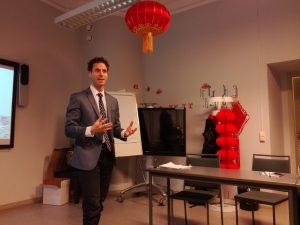 Kangle Zhang is a doctoral candidate in the discipline of international law, and a research fellow at Erik Castrén Institute of International Law and Human Rights, University of Helsinki. His doctoral dissertation entitled ‘Not Equal: Towards an International Law of Finance’ focuses on income and wealth inequality that is linked to operations in the international financial market (and the potential of international law for fighting it). On 17 August 2020, he will defend his dissertation with Professor Anne Orford (Melbourne Law School) serving as opponent and Professor Martti Koskenniemi (University of Helsinki) as custos. The Finnish China Law Center took the opportunity to discuss with Kangle about his experience as a doctoral student at the University of Helsinki, and about his involvement in Chinese law-related activities at the University of Helsinki and the Finnish China Law Center.
Kangle Zhang is a doctoral candidate in the discipline of international law, and a research fellow at Erik Castrén Institute of International Law and Human Rights, University of Helsinki. His doctoral dissertation entitled ‘Not Equal: Towards an International Law of Finance’ focuses on income and wealth inequality that is linked to operations in the international financial market (and the potential of international law for fighting it). On 17 August 2020, he will defend his dissertation with Professor Anne Orford (Melbourne Law School) serving as opponent and Professor Martti Koskenniemi (University of Helsinki) as custos. The Finnish China Law Center took the opportunity to discuss with Kangle about his experience as a doctoral student at the University of Helsinki, and about his involvement in Chinese law-related activities at the University of Helsinki and the Finnish China Law Center.
Finnish China Law Center: Could you say a little about your background?
Mr. Kangle: Many thanks for asking me to do the interview. I was at first resistance toward the idea—I was not sure if any of my experience might be of interest to other, nor if this interview could go beyond the normal praise. But perhaps this would also be a point of reflection for myself, and it might serve institutional purposes.
I have been at University of Helsinki for 6 years. Before this, I did my undergraduate degree in international politics and master’s degree majoring in international law in China at Peking University. I would be so bold as to label myself an “internationalist”. Peking University is genuinely a great place for academic advancement—I developed my interest in international law there with the encouragement of my professors.
On a more personal level, I war born and raised in a small village in Ningxia Hui Autonomous Region in the north-west of China. I have definitely benefited from the economic growth of China, in the sense that the broader social mobility accompanying economic development enabled me to receive education at levels would be unimaginable at my parents’ generation.
Finnish China Law Center: Could you tell us about your doctoral research? What is your motivation behind pursuing the topic?
Mr. Kangle: My doctoral thesis starts by describing the link between the international financial market and economic inequality. From there, it [i] examines the law of international finance and its relation to inequality, [ii] suggests an explanation for the nonchalance of the financial system and rules therein towards enlarging inequality, and [iii] proposes the inclusion of international financial market into the purview of international law research—the nexus of an international law of finance. The dissertation suggests that an international law of finance would be a field where international lawyers actively engage with the intertwined network of actors and rules in the financial market, where they master the vocabulary and grammar of finance, dissect the distributive significance of the legal design of the financial market, and make good use of their toolbox by examining the role of state in enabling financial market operations.
My biggest motivation is to understand inequality and if possible contribute to fighting it. I grow up in rural China and the periods of my study in Beijing, plus my years in Finland (and for sometime in the US and UK), have exposed me to the reality of inequality. In Finland, the societal organization is quite different (comparing with many parts of the world) in the sense that generally, some basic social welfare measures are in place. However when comparing the living situation in Finland and in for example China, it definitely raises some questions. I tend to think that the inequalities (and related to which human suffering) are related to money and finance. And considering that the architecture of finance are, broadly speaking, legal arrangements, I deem that (international) lawyers might be offering some useful ideas in fighting inequality that is related to the financial market operations.
My second motivation lies in an observation, that a growing amount of students from “elite” universities are going to the finance industry. This trend has been witnessed (and written about) in different countries. This seems to suggest some sorts of changes in the ways economies are organized. At the same time, the financial system is essential to the economy, both in the sense that its collapse leads to a broader economic recession and that it could be offering the necessary support in times of crisis. And all these are fiercely debated in economics. In other words (and for lawyers and regulators), we do not really know how to cope with this field that is significantly important in our societies and to people. I took the doctoral project as a process of learning and understanding about finance and societal organization.
The third and perhaps more theoretical motivation lies in my interested in the public/private distinction. Debates on international economic order, domestic societal organization, development, and globalization seem to hinge on an idea of a continuum of governmental intervention into the market. In other words, oppositional categories—of government and market, public and private—are assumed, regardless of the abstractness and indeterminacy of each category. Such a distinction penetrates deeply into our daily lives, reifies legal institutions and processes, and shields exploitation and unjust distribution from contestation. I tend to think that the financial system (and more specifically money) is a fundamental domain in which this distinction functions—that finance is the linkage between different social actors and their activities. And the operations of the financial system are enabled by this very distinction.
Finnish China Law Center: How has your experience been being a doctoral student at the University of Helsinki?
Mr. Kangle: Perhaps three points are worth mentioning here. First, the Doctoral Programme at Helsinki (and perhaps the Nordic countries in general) is quite different comparing with it in many other parts of the world. Here you are in a way considered a (quasi-)faculty member. This means that you have teaching obligations and are actively involved in the broader discussions at the faculty. I have very much benefited from this process. I enjoy teaching quite a lot, and in order to teach something, I need to try and understand the subjects as much as possible. I have also had the opportunity to teach what I am researching on, which helped with my own research.
Second, writing a dissertation at the Erik Castrén Institute is fantastic. The enthusiastic doctoral students, visiting researchers and very helpful (and sometimes very critical) senior scholars make this a vibrant and thought-provoking community.
Third, the Finnish China Law Center serves as a great platform for discussion on China-related legal issues. I have actively tried to avoid writing about China in my dissertation. In fact I am quite tired of all the China related works by Chinese researchers—there is some value in it but I do not see how better academic works could be produced if it is only the Chinese working on China-issues, the Indians working on Indian-issues, the Kenyians working on Kenya-issues (for example). That said, I am most definitely interested in China-related matters, and the Finnish China Law Center brings in many scholars from various backgrounds and with often very different views. I have quite enjoyed some of the events and discussions at the Center.
Finnish China Law Center: What do you think about the research and education in Chinese law and legal culture at the University of Helsinki?
Mr. Kangle: In terms of research in law, I have seen some really interesting works by Professors Ulla Liukkunen and Yifeng Chen. I was not involved in the few Chinese law research projects thus cannot speak on these projects. I did work with Professor Kimmo Nuotio and Professor Wenhua Shan at Xi’an Jiaotong University in publishing a edited volume tiled ‘Normative Readings of the Belt and Road Initiative: Road to New Paradigms’. I appreciate the research initiatives at the University of Helsinki, and Helsinki is most definitely an important habour in research (and education) in Chinese law and legal culture internationally. Perhaps it would be beneficial furthering the link between the legal research works and the legal practices. The growing international commerce certainly calls for legal support in, for example, tax, arbitration, or even more practically shipment issues. This is perhaps not just for Finnish business but also the broader northern European business community. Some good initiatives have been taken and I am hoping to contribute in this process.
When education is concerned, our Faculty (and the University) has established connections with many Chinese universities. This offers not only a platform for scholarly communication but also (and perhaps more importantly) for student exchanges. I think these are great endeavors and will be of benefit in the long run.
Finnish China Law Center: How have you been involved in furthering Chinese law research activities and cooperation with Chinese partners at the University of Helsinki and the Finnish China Law Center?
Mr. Kangle: As mentioned, I have worked to co-edit a volume on the Belt and Road Initiative (BRI). The volume started at an international conference on the BRI in Helsinki under the umbrella of the new New Silk Road Law Schools Alliance. I have acted as a contact person for our faculty in the Alliance. Perhaps a few more words on the Alliance: it is consisted of twenty-some law schools internationally, seeking to promote research and teaching collaborations. Through the Alliance, our faculty built and furthered connections with the National University of Singapore, the University of Hong Kong, Taiwan University, and many other universities in different parts of the world including Australia and the US. I have also participated in interesting conferences and seminars at the Center. I would also wish to add that I will be involved in the Global Governance Law master’s programme starting the next academic year, to teach a course on Chinese financial regulations. I am also very much looking forward to join and be involved in the activities at the Center now that I am almost done with my doctoral research.
Finnish China Law Center: Do you have any plan after the doctoral degree?
Mr. Kangle: If everything goes smoothly and nothing too majorly wrong happens, I will take up a two-year postdoc position at Peking University Law School. In these two years, I would like to expand my doctoral thesis and do more research relating to the potential of international law in fighting income and wealth inequality.












